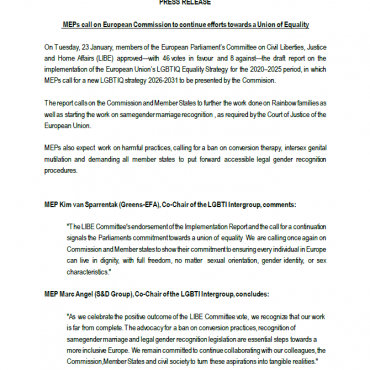Slow progress for LGBT people in EU accession countries
Today the European Commission released its annual reports on the progress made towards accessing the EU. The documents assess recent evolutions in all areas related to the European Union, including fundamental rights in each of the four candidate countries (Croatia, Iceland, the Former Yugoslav Republic of Macedonia, Turkey) and five potential candidates (Albania, Bosnia and Herzegovina, Kosovo, Montenegro, Serbia).
The reports present a nuanced picture of the situation for lesbian, gay, bisexual and transgender (LGBT) people in accession countries. Although some progress has been made, the great majority of accession countries still fall short of EU standards for the fundamental rights of LGBT people.
All candidate countries apart from Iceland raised some concern. In Croatia, it was noted that LGBT people face threats and attacks. Macedonian law-makers failed to include sexual orientation in the list of grounds protected from discrimination. And Turkey is cause for concern with a very high number of transgender people murdered; the abusive fining of transgender people; and administrative obstacles used against the registration of LGBT associations.
Among potential candidate countries, Albania has seen positive developments in the building up of civil society organisations and progressive anti-discrimination laws, even though intolerance remains very widespread. Bosnia and Herzegovina saw its imperfect anti-discrimination law left untouched, and hateful harassment unpunished by authorities. The government of Kosovo ran a campaign against discrimination, yet discrimination ‘on the ground’ has continued. Montenegro was the site of positive legal advances which have yet to be implemented. And Serbia was praised for allowing a Pride parade to go on peacefully for the first time.
Ulrike Lunacek MEP (Co-President of the LGBT Intergroup and Foreign Affairs Spokesperson for the Greens/EFA) and Michael Cashman MEP (Co-President of the LGBT Intergroup), welcomed the publication of the reports: “We’re very pleased Commissioner Füle made a point of including LGBT issues in each report, sometimes extensively. Now for the real deal: accession states have to work along the lines of EU integration. And to be sure, the European Parliament will be present, both to help and to stress the importance of non-discrimination and equal rights.”
The European Parliament will now produce its own position for each candidate country, to be adopted in February 2011.







